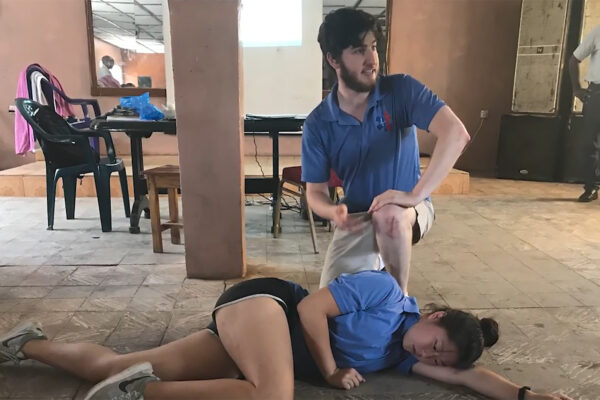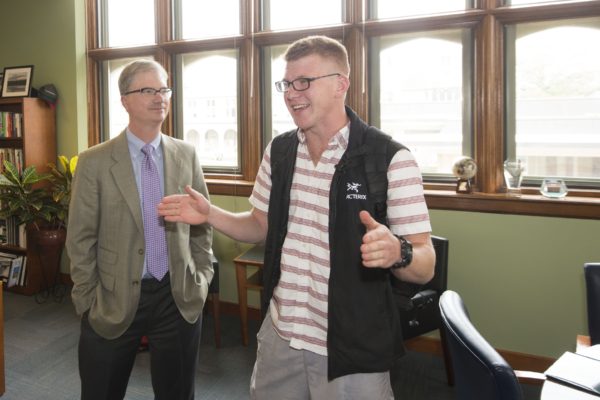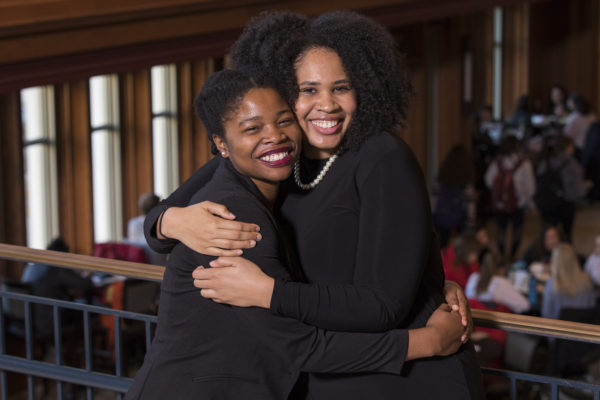Chancellor Andrew D. Martin (lower image) surprises Truman Scholars Max Klapow (left) and Zach Eisner. (Video: Tom Malkowicz/Washington University)
Roommates and best friends Zach Eisner and Max Klapow, juniors at Washington University in St. Louis, have both won a Truman Scholarship, the premier graduate fellowship in the United States for those pursuing careers as public service leaders. Both Eisner and Klapow will receive $30,000 for graduate study.
Eisner and Klapow are two of 62 scholars selected from a competitive field of 773 applicants. For one institution to boast two winners is rare. For those two winners to be best friends is remarkable.
“We knew the odds of two best friends winning are just so slim. Honestly, we’re still in shock,” Eisner said.
Eisner, a biomedical engineering major in the McKelvey School of Engineering, and Klapow, a philosophy-neuroscience-psychology major in Arts & Sciences, were surprised with the news April 13. The students logged on to Zoom expecting an update on their applications from Grizelda McClelland, assistant dean in Arts & Sciences.
Instead, Chancellor Andrew D. Martin popped onto their screens.
“I’m just going around Zoombombing people to see what’s going on,” Martin joked. “No, actually I had a purpose in reaching out to the two of you. I’ve got some really good news from the Truman Foundation.”
In tandem, the friends gripped their heads and exclaimed, “Wow!”
“Being able to push each other and to do work that we care about that is really different but still support each other has been amazing,” Klapow told Martin.
Eisner and Klapow, also Alpha Delta Phi fraternity brothers and Pikers a cappella performers, are not the first WashU friends to achieve their dreams together. In 2017, Camille Borders and Jasmine Brown, Ervin Scholars and Alpha Kappa Alpha sorority sisters, were selected as Rhodes Scholars. To McClelland, these recent successes highlight the spirit of collaboration at Washington University.
“I am always amazed by our students,” said McClelland, who helps students navigate applications for fellowship programs. ”Yes, they are exceptional thinkers and bold visionaries, but they also support one another. Max and Zach embody that ethos.”

Expanding access to emergency medicine
Eisner, of Los Angeles, hopes to earn a joint medical and master of public health degree and work in the young field of global health and surgery.
“My goal is to combine a passion for public service, global health and medicine, while working to empower disadvantaged communities throughout the world,” Eisner said.
He also plans to use graduate education to inform his role as operations director of LFR International (LFR stands for lay first responder). The nonprofit he co-founded offers lifesaving first-aid training in nations without advanced emergency medicine; researches best practices in first aid education; and advocates for Good Samaritan laws.
Last year, Eisner and other members of LFR International taught 1,000 people in Sierra Leone how to stop bleeding, conduct CPR, splint a broken bone and transport an injury victim on the back of a motorcycle.
“Zach not only roused national support to create the First Responder Coalition of Sierra Leone, achieving buy-in from the University of Makeni, the Sierra Leone Red Cross Society, the largest hospital in the Northern Province of the country and a local partner NGO, but he had also written the first draft of the coalition’s constitution and coordinated and trained 500 of the 1,000 community members we planned to train that summer in first aid with local partners,” LFR co-founder and 2018 alumnus Peter Delaney wrote to the selection committee.
“His ability to inspire others to rally around a cause and effect change is incredibly impressive, and, for a career in the public sector, I can think of no better quality to possess.”
Empowering incarcerated people through positive psychology

Klapow, of Birmingham Ala., is a Danforth Scholar; a Gephardt Institute for Civic and Community Engagement Civic Scholar; co-founder of Human at Work, which trains facilitators in group coaching programs to help people and organizations thrive; and creator of the Prison Wellbeing Project, which strives to improve psychological health in prisons everywhere.
Klapow plans to pursue a doctorate in clinical psychology, with the goal of leveraging the science of psychological resiliency and well-being to help incarcerated and formerly incarcerated communities. The work would build on his experience with Washington University’s Prison Education Project (PEP), where he helped develop writing courses that incorporated positive psychology skills.
“For the first time, my students had opportunities for self-growth, tools for improving their own life, and the chance to actually practice techniques that encourage pro-social living, Klapow wrote of his time in the PEP classroom. “By the end of that term, those men showed me just about anyone can flourish. They showed me, against all odds, just how transformative wholehearted learning, honest connection and a little bit of hope can be.”
PEP instructor Victoria Thomas was wowed by Klapow’s commitment to his students at the Missouri Eastern Correctional Center and his ability to put research into practice in the prison classroom.
“Max’s work improved the mental health of incarcerated people and gave them the courage to approach the challenges of rehabilitation,” said Thomas, a senior lecturer in English and in American literature in Arts & Sciences. “The genius of his project is that, with willingness and some training, it can be replicated widely.”


